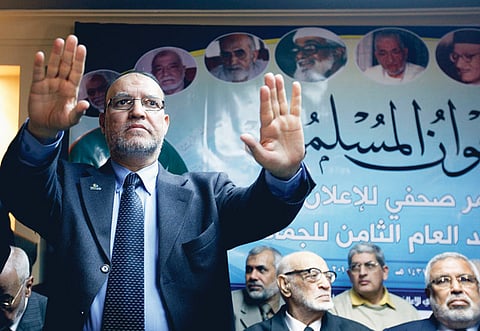Brotherhood wants an inclusive democratic system to flourish
Parliament must represent all sections of society, leader says

Cairo: Banned for years under President Hosni Mubarak, the Muslim Brotherhood now functions openly in Egypt and is expected to win a sizeable bloc of seats in the upcoming parliamentary elections.
Washington Post interviewed Essam Al Erian, a physician and senior member of the brotherhood's ruling guidance council, in the organisation's new $11 million headquarters on May 4.
Following are excerpts:
You think the army got rid of Mubarak?
Yes, after they saw millions of people in the streets .... Your [the US] administration tried to give him a shelter as they do now with (Libya's Muammar) Gaddafi and (Yemen's Ali Abdullah) Saleh.
Will the Muslim Brotherhood win the next election because it is so organised?
The next election must represent all political factions, even weak groups. We as the Muslim Brotherhood are keen to have a coalition to go to the elections together, to have a parliament that represents all Egyptians, not only powerful groups.
All Egyptians must be represented — Muslims, Coptics, leftists, liberalists, nationalists, Islamists — all must be there to have a neutral committee to write the constitution. This is very important for a real democracy.
Do you think the Muslim Brotherhood will have the largest bloc in the parliament?
The last election in 2005, which was semi-free and semi-fair, we gained 20 per cent of the seats.
In the next election, we are not targeting the majority at all. So we will nominate between 45 to 50 per cent ... I think it would be fair to gain 30 per cent in a free and fair election.
Let's talk about your vision for a new Egypt.
It must be democratic with a parliamentary system, cooperating with the region, cooperating with the world.
We have common values. We are ready for democracy, we are fighting for freedom.
What about America? Do you see good relations continuing?
Of course. But America must respect this independence of Egypt.
We have no problem with the US except that it supported Mubarak for 30 years continuously and without bothering to stop his violations of human rights.
What about Israel? Will Egypt keep the treaty?
The state would keep the treaty.
Would you keep the treaty?
Yes, a new parliament would make that decision. The army says frankly, and we say it also: We cannot cancel a treaty by a verbal decision.
Do you think Egypt should be ruled by sharia law?
The principles of sharia are the main source of legalisation. That is in the constitution. You look for sharia as a foundation.
What does it say about the role of women?
They are equal to men.
So could a woman run for office?
Of course, if the people elected her.
What about minorities?
They have equal rights.
People say the Muslim Brothers are using the Salafis, who practise a fundamentalist form of Islam.
Never — the Salafis were used against us.
So you have a relationship with them?
Not a relationship, no. They have some doubts about democracy.
They are extremist in some affairs about women. But the majority of them are non-violent. We advise them to respect democracy, respect Copts.
Do you want to see Mubarak put on trial?
(Perhaps) he can pass away safely. He is an elderly man, a sick man... Mubarak put me in jail for about eight years, but I never felt revenge toward him.
He had many opportunities, many options to save himself and his family and the country. He lost them all.
And the people here can forgive him for anything, but they cannot forgive him for ordering the police to kill people in the streets.
— Washington Post
Sign up for the Daily Briefing
Get the latest news and updates straight to your inbox



